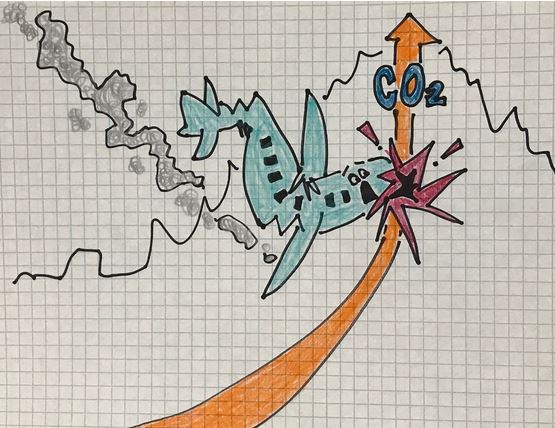Image credit Therese Brummel
Edited by Jadene Mayla
Just like all of my other projects, my interest in the carbon footprint of flying was strong enough for me to seek out scientist and author Peter Kalmus. In our April 13, 2018 Skype call, he explained that when he calculated his carbon footprint, he was surprised to discover that the biggest culprit was flying. So he made the commitment to not fly. (See his book Being The Change.) When he asked other scientists how they can square flying with what they know about climate change, they said “I just don’t think about it”.
When I interviewed Peter over Skype I discovered that it can be hard for a scientist to give up flying. Think of all of the conferences held in other countries, all those chances to network and boost their career.
Peter wanted to see if there were other scientists who had committed to not flying, so he started No Fly Climate Sci https://noflyclimatesci.org/ in 2017. It made him “feel less crazy” and helped him find his community. But he wants more. He wants to change the current culture so that more scientists, and non-scientists too, will choose to not fly.
What if it became uncool to fly? Flygskam, or “flight-shame”, is cited as the cause of reduced flights in Sweden. But in the US, the current culture ignores the disconnect. Why is it that we can fly and not think about the damage that flying is doing to the planet through a huge per capita dose of carbon emissions? How can we change the culture, right away?
Climate scientists are more familiar with the data and are prime candidates to start this cultural shift, hence the name of Peter’s website. But next, Peter thinks, academics in general should jump on board. That would also help because academic institutions are involved with most of the conferences that scientists fly to.
Academic institutions could offer alternatives to flying in the form of online and local conferences for scientists. And if scientists could model this localization and digitization of climate crisis mitigation behavior, it might help the rest of us rethink our assumptions about airplane travel.
So far 17 academic institutions have signed on at NoFlyClimateSci.org. The University of Maryland signed on and said that their ultimate goal is “to eliminate the university’s air travel carbon footprint”.
We are not all scientists or even academics. So what about the rest of us? We fly to visit our families, we fly for work, and we fly for fun.
Maja Rosén was flying as a tourist from Sweden to Norway when she suddenly realized that the flight she was on was melting the glaciers in the very fjords she had come to see. So she started her own initiative, a website asking people to pledge not to fly. She realized that it would be easier for folks to make that pledge if it were short-term, for just one year, and only if 100,000 other people also pledged. You can do anything for just one year, right?
When 100,000 people do something, that’s a movement. You can be a part of hers by signing the pledge. The USA version is here: https://www.flightfreeusa.org and you can read some of the many stories by people who have signed the pledge here: https://www.flightfreeusa.org/our-stories
Locally here in Pasadena, we need to start talking about flying, or rather not flying. Talking about not flying may be hard to do. We as a community can disagree due to our various lifestyles and work, etc. The decision can divide families, workplaces, and even travel companions. It may be hard to convince others or the public at large, but any of us can make a pledge about our own choice of transportation when it comes to traveling. Peter’s site is a great place to write about your own personal decision not to fly or to fly less. All are welcome to join.
Next, we need to act. US Representative Curt McCormack of Vermont took the pledge to not fly in 2020. He said “something has got to give. We have to stop talking about climate and start acting. I will keep taking Amtrak.”
The climate crisis is a genuine climate emergency, and one of the best reasons to stop flying is to communicate that emergency via actions. You can help spread this movement. Go to https://noflyclimatesci.org/ and tell your story of why you have decided to stop or reduce flying, and go to https://www.flightfreeusa.org and pledge to not fly in 2020. You can also write your local elected officials and ask them for their thoughts on this topic. You might be surprised by what they tell you when they write you back.
I invite you to think about this issue and take action.




